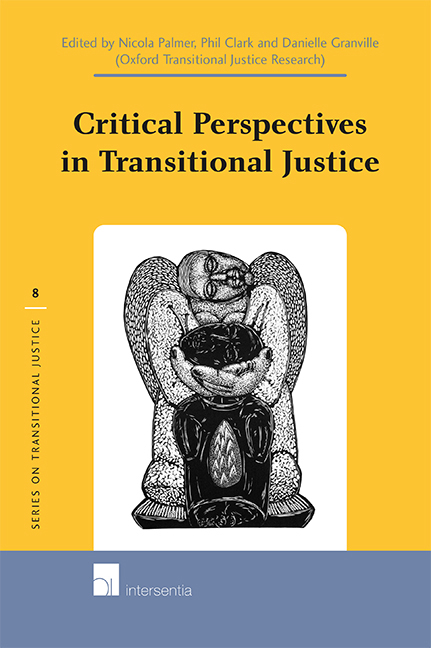Book contents
- Frontmatter
- Note
- Acknowledgements
- Contents
- Abbreviations
- Introduction
- Section 1 Critiquing Core Concepts in Transitional Justice
- Section 2 Accountability, Human Rights and the Rule of Law
- Section 3 Locality and Legitimacy
- Section 4 Memory, Ritual and Apology
- Section 5 Transitional Justice After Transition
- Contributors’ Biographies
- Series on Transitional Justice
8 - Hybrid Human Rights Mechanisms in Post-Conflict Transitions: The Experience of the Bosnian Human Rights Chamber
Published online by Cambridge University Press: 22 December 2020
- Frontmatter
- Note
- Acknowledgements
- Contents
- Abbreviations
- Introduction
- Section 1 Critiquing Core Concepts in Transitional Justice
- Section 2 Accountability, Human Rights and the Rule of Law
- Section 3 Locality and Legitimacy
- Section 4 Memory, Ritual and Apology
- Section 5 Transitional Justice After Transition
- Contributors’ Biographies
- Series on Transitional Justice
Summary
INTRODUCTION
Societies emerging from a long period of armed conflict often lack a judicial tradition that complies with international notions of the rule of law and respect for human rights. When local regulations and policies openly defy such principles, it is sometimes necessary to take recourse to international human rights law to re-establish the rule of law. The problem with such an approach, however, is that international human rights standards are not specifically geared towards the needs and challenges of post-conflict societies. Such standards are often too general, without providing specific and comprehensive guidance on such salient issues for post-conflict situations as property restitution or the provision of other effective remedies and reparations. Thus a judicial intermediary seems to be called for to interpret international norms in the light of local conditions. In this regard, the most obvious actors to perform such task would be national judges. However, in the immediate post-conflict phase national judicial mechanism are often either not functioning or heavily tainted by their links to one of the warring parties. Thus both their effectiveness and legitimacy are, more often than not, weak. Some kind of mixture between purely local and purely international justice – both in composition, legal basis, and normative standards – could possibly counter the disadvantages of the two extremes. Such a mixed or hybrid institution would offer stronger guarantees of independence and impartiality than national judiciaries. At the same time, it would have the potential to safeguard the local embeddedness of such an institutionalized attempt to re-establish the rule of law. This local element increases the long-term viability and effectiveness of such a process towards compliance with the rule of law.
Hybrid institutions have emerged since the 1990s mainly in the context of criminal law, for example in Sierra Leone and Cambodia. These institutions were created precisely to avoid the problems mentioned above of both purely domestic and of completely detached international mechanisms of rendering justice. Such hybrid criminal law institutions are increasingly perceived as key components in addressing the problems of post-conflict societies. However, little attention, both in practice and academia, has been paid to hybrid human rights institutions in the post-conflict phase. This is all the more surprising since one of the first hybrid judicial mechanisms of the 1990s – the Human Rights Chamber in Bosnia and Herzegovina – was a human rights mechanism and not a criminal law institution.
- Type
- Chapter
- Information
- Critical Perspectives in Transitional Justice , pp. 147 - 168Publisher: IntersentiaPrint publication year: 2012

